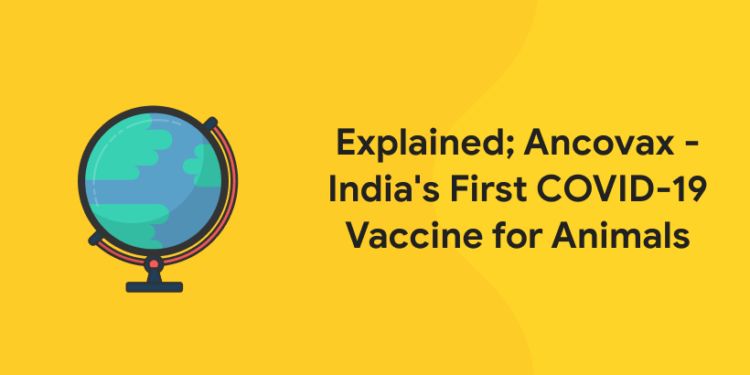Table of Contents
As COVID-19 cases spread across India, the Centre launched Ancovax, the country’s first covid vaccine for animals against the SARS-CoV-2 virus, on June 9.
Ancovax, a COVID-19 vaccine for animals such as dogs, lions, leopards, mice, and rabbits, comprises an inactivated SARS-CoV-2 (Delta) antigen capable of neutralizing both Delta and Omicron forms. This vaccine is one of six that the Indian Council of Agricultural Research-National Research Centre on Equines (ICAR-NRCE) has developed and produced on-site.
At the ICAR Center in Hisar, Haryana, the launch event was attended by Union Minister of Agriculture & Farmers’ Welfare Narendra Singh Tomar. Along with Ancovax, Tomar also introduced the CAN-CoV-2 ELISA Kit, the Surra ELISA Kit, the Equine DNA Parentage Testing Kit, and the Surra ELISA Kit, which detects Trypanosoma evansi infection in animals (determining parentage in horses and other equines).
Scientists’ tireless efforts are the reason why the nation is more self-sufficient in creating its own vaccines than in importing them. The COVID-19 vaccination and diagnostic kits for animals created by the ICAR-NRC were virtually launched, and agriculture minister Narendra Singh Tomar commented, “This is definitely a significant achievement.
What is Ancovax?
According to a statement released publicly by ICAR, the Ancovax vaccine is an inactivated SARS-CoV-2 Delta (COVID-19) vaccine that can be used safely on dogs, lions, leopards, mice, and rabbits to prevent the COVID-19 virus. The vaccine includes an adjuvant called Alhydrogel together with an inactivated SARS-CoV-2 (Delta) antigen. Ancovax is the only vaccination capable of neutralizing the COVID-19 virus in animals, a first for India.
The first Covid-19 vaccine for animals in India In addition to wild and laboratory animals, Ancovax was tested on domesticated and stray dogs. Dogs, lions, leopards, mice, and rabbits can all receive it.
Director General of ICAR Dr. Trilochan Mohapatra stated, “In numerous Indian cities, the vaccine was tested on canines belonging to the army, pets, and stray dogs, as well as on wild and laboratory animals. It was determined to be risk-free and to have no negative effects.”
He further stated that ICAR is seeking a private collaboration to ramp up the production of Ancovax dosages. He added that although the vaccine had been created and released, it still required the proper clearances before it could be made available to end consumers. Ancovax should be administered in zoos and national parks first, according to the ICAR.
The Need for Ancovax
Covid-19 infection in a variety of animals, including dogs and cats, has been reported. “The vaccine can shield zoo animals. It can help stop the spread of disease from pets to people, according to Dr. Jyoti Misri, senior scientist at the Indian Council of Agricultural Research.
According to the US Centers for Disease Control and Prevention, there is little chance that animals may infect people. The vaccine’s purpose is to safeguard threatened species like lions and tigers. Last year, India reported at least nine Covid infections in Asiatic lions at the Chennai Zoo, with one lioness possibly passing away as a result. Because of this, tiger reserves were closed to tourists. In addition, a dead leopard cub was discovered and later tested positive for Covid-19, and a study by the Indian Veterinary Research Institute discovered at least three spontaneous Covid infections in wild Asiatic lions.
“A few cases have been documented in wild animals all around the world, some from zoos, and others in pets. However, it is a very small percentage. The animals experience the same symptoms as people do, including lung lesions, a cough, a cold, and fever. A vaccination would help, though, as the illness is zoonotic [it may spread from animals to humans]. The vaccination that we employ, nevertheless, needs to be carefully chosen, according to Dr. AB Shrivastav, a former director of the School of Wildlife Forensic and Health in Jabalpur.
Attempt Free General Knowledge Mock test! Download Entri App!
Why inactivated vaccines are important
Vaccines come in a variety of forms, including live-attenuated vaccines (which employ weakened viruses), viralvector vaccines (which use viruses as a vehicle to deliver genetic information to the immune system in order to activate it), etc. Ancovax is an inactivated virus vaccine, which means it makes use of a virus that has been “killed” (inactivated) by radiation, heat, or some other substance.
Live vaccines in wild animals are avoided. This is due to the fact that a live vaccination may have been attenuated for one species [such as humans], but it still may be able to infect another, according to Dr. AB Shrivastav, a former director of the School of Wildlife Forensic and Health in Jabalpur, as quoted by The Express.
He gave an African example, saying, “Some 15 or 20 years ago, a rabies vaccination created for dogs was administered to wolves in Africa, and the entire pack perished. A virus vaccination that has been killed won’t hurt the animals.
Testing kits were also developed.
Additionally, two animal testing kits were introduced by Union Agriculture Minister Narendra Singh Tomar. Tomar introduced the “CAN-CoV-2 ELISA kit” for canine coronavirus antibody detection.
“The preparation of the antigens doesn’t need the use of lab animals. The kit is produced in India, and a patent application has been made. There are no other comparable kits for canine antibody detection on the market “the ICAR, according to PTI.
A Surra ELISA kit was also introduced, which can identify infection in many animal species. In all of India’s agro-climatic regions, Surra is one of the most significant haemoprotozoan diseases of the various livestock, according to the ICAR. According to the ICAR, Surra caused production losses to livestock in India estimated at Rs 44,740 million yearly. Equine DNA parentage testing kit, a potent genomic tool for determining the paternity of horses, according to PTI. In addition to these items, more animal research is being done.
According to Dr. Tripathi of ICAR, research is being conducted to create newer anti-Covid vaccinations for animals using several vaccine platforms, including viral vector and mRNA.
The ICAR is conducting more detailed research on suspected animal-to-human transmission as well as animal-to-animal Covid transmission. If the virus mutates in the animal population, it will be interesting to learn about it.
Prepare for General Knowledge Exam! Download Entri App!
Why Type Matters
Dr. Shrivastav stated that a killed vaccination for wild animals is usually preferable to a live-attenuated vaccine while failing to comment on this particular vaccine in particular (where a weakened live virus is used).
Live vaccines in wild animals are avoided. This is due to the possibility that a live vaccine that was attenuated for one species may nonetheless be harmful to another. A rabies vaccination created for dogs was administered to wolves in Africa some 15 or 20 years ago, and sadly the entire pack perished. According to him, an inactivated virus vaccine won’t hurt the animals.
Why do animals need a COVID-19 vaccine?
1: Who was the first woman President of India?
When Denmark killed 17 million mink in 2020 after a study revealed that a strain of the virus had spread from people to mink, the necessity for a COVID-19 vaccination for animals became apparent. Later, humans were found to carry altered versions of the mink virus. The strain was thought to have the potential to reduce the effectiveness of vaccines, which prompted the Danish government to order the mass slaughter of all minks in the country.
The illness had wiped out Denmark’s $800 million yearly fur business, and the government had also suggested banning all mink reproduction until 2022. Carnivac-Cov has been purchased by numerous Russian fur farms with operations in Greece, Poland, and Austria in an effort to stop the further spread of the mutant strain across countries.
The first recorded animal infection case in India occurred in May 2021 when eight Asiatic lions at Hyderabad’s Nehru Zoological Park tested positive for the novel coronavirus. On April 24, 2021, zookeepers became aware of symptoms in the four male and four female large cats, including a dry cough, nasal discharge, and appetite loss. They immediately notified the veterinary staff. The large cats quickly recovered after receiving treatment for minor symptoms.
Soon later, in June 2021, two lions in a zoo outside of Chennai succumbed to COVID-19 after exhibiting signs like coughing and appetite loss. At least 10 additional lions in the same zoo got the same infection but quickly recovered.
Attempt Free General Knowledge Mock test! Download Entri App!
Free UPSKILLING Courses!
Take your first step toward mastering in-demand skills, acing interviews, and securing top-tier jobs with Entri's free upskilling courses.
Start Learning!What are the other COVID vaccines for animals?
Prior to Ancovax, testing revealed that the COVID-19 vaccine Carnivac-Cov produced antibodies against the COVID-19 virus in dogs, cats, foxes, and mink. In March 2021, Russia registered Carnivac-Cov as the first COVID-19 vaccination for animals in the world. According to a Reuters story, dogs, cats, Arctic foxes, mink, and other animals were used in the clinical trials, which got underway in October 2020. The trials, which were initially carried out on ferrets, indicated that the animals continued to exhibit an immunological response for at least six months after the trials started.
In April 2021, Russia produced its first batch of 17,000 doses of Carnivac-Cov. The vaccine was given to cats and other domestic animals across multiple veterinary clinics in Russia. It is said to be capable of defending susceptible species and preventing COVID-19 mutations. Up until that point, only two feline instances of COVID-19 had been reported in Russia.
According to a statement by Rosselkhoznadzor, numerous businesses in Germany, Greece, Poland, Austria, Kazakhstan, Tajikistan, Malaysia, Thailand, South Korea, Lebanon, Iran, and Argentina had showed interest in purchasing Carnivac-COV.
After eight gorillas were sick in the San Diego Zoo in July 2021, the US pharmaceutical company Zoetis gave almost 11,000 doses of its experimental COVID-19 vaccine to close to 70 zoos as well as conservatories, sanctuaries, and academic institutions around the country. The company’s vaccine, which was created in January 2021, has been given case-by-case approval by the US Department of Agriculture for experimental usage (USDA). After a dog contracted COVID-19 in Hong Kong in February 2020, Zoetis started developing an experimental animal vaccination.
According to Zoetis, the vaccine has been confirmed to be safe and has a reasonable expectation of efficacy after being tested first on dogs, cats, and then minks.
Attempt Free General Knowledge Mock test! Download Entri App!
Conclusion
As COVID-19 cases expand throughout India, animal vaccines may be required to safeguard animals reared for their fur and to prevent pets from transmitting the virus to humans. As instances spread throughout the nation, India now has the first COVID-19 vaccination to shield animals from infection. Anocovax is a domestic vaccine created by the ICAR-National Research Centre on Equines (NRC) in Haryana.
ENTRI – The best online learning platform
Entri is a website that assists with exam preparation for all banking and government exams. Anyone who wants to succeed in the tests is welcome to join our student body. Our expertly designed seminars, free practice exams, practice papers, and current affairs notes will help you achieve your goal of working for the government. We provide learning resources, such as top lectures, video classes, sample questions, etc., to our subscribers. Do not wait to download Entri App and begin your trial learning if you want to have access to the entri classes.














